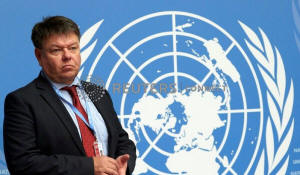Greenhouse gases surge to record in 2018, exceeding 10-year average
rate: U.N
 Send a link to a friend
Send a link to a friend
 [November 25, 2019]
GENEVA (Reuters) - Greenhouse gases
in the atmosphere hit a new record in 2018, rising faster than the
average rise of the last decade and cementing increasingly damaging
weather patterns, the World Meteorological Organization (WMO) said on
Monday. [November 25, 2019]
GENEVA (Reuters) - Greenhouse gases
in the atmosphere hit a new record in 2018, rising faster than the
average rise of the last decade and cementing increasingly damaging
weather patterns, the World Meteorological Organization (WMO) said on
Monday.
The U.N. agency's Greenhouse Gas Bulletin is one of a series of studies
to be published ahead of a U.N. climate change summit being held in
Madrid next week, and is expected to guide discussions there. It
measures the atmospheric concentration of the gases responsible for
global warming, rather than emissions.
"There is no sign of a slowdown, let alone a decline, in greenhouse
gases' concentration in the atmosphere - despite all the commitments
under the Paris Agreement on Climate Change," said WMO Secretary-General
Petteri Taalas.

"This continuing long-term trend means that future generations will be
confronted with increasingly severe impacts of climate change, including
rising temperatures, more extreme weather, water stress, sea level rise
and disruption to marine and land ecosystems."
The concentration of carbon dioxide, a product of burning fossil fuels
that is the biggest contributor to global warming, surged from 405.5
parts per million in 2017 to 407.8 ppm in 2018, exceeding the average
rate of increase of 2.06 ppm in 2005-2015, the WMO report said.
[to top of second column]
|

World Meteorological Organization (WMO) Secretary-General Petteri
Taalas attends a news conference at the United Nations in Geneva,
Switzerland, November 25, 2019. REUTERS/Denis Balibouse

Irrespective of future policy, carbon dioxide stays in the
atmosphere for centuries, locking in warming trends.
"It is worth recalling that the last time the Earth experienced a
comparable concentration of CO2 was 3-5 million years ago," Taalas
said.
Levels of methane - a much more potent greenhouse gas than CO2 - and
nitrous oxide also hit new records, the report said.
The U.N. Environment Programme's annual "emissions gap" report, due
on Tuesday, assesses whether countries’ emissions reduction policies
are enough.
(Reporting by Emma Farge; editing by Stephanie Nebehay and Kevin
Liffey)
[© 2019 Thomson Reuters. All rights
reserved.]
Copyright 2019 Reuters. All rights reserved. This material may not be published,
broadcast, rewritten or redistributed.
Thompson Reuters is solely responsible for this content.
 |